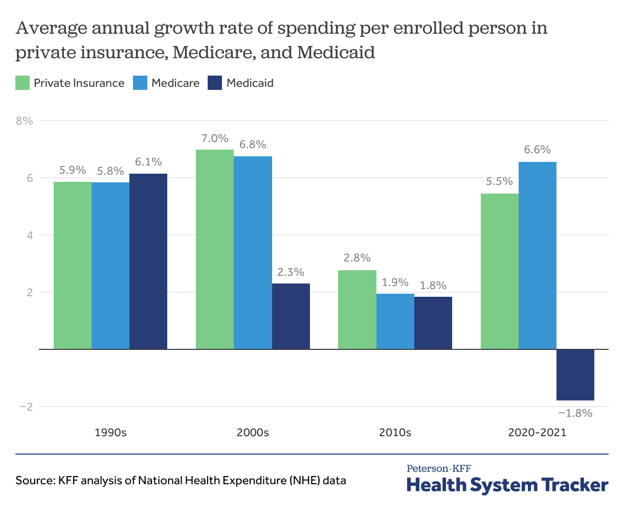In recent years, there has been a significant reduction in government funding for healthcare. This has had a major impact on healthcare companies, who are now facing increased financial pressures.
For example, between 2010 and 2020, federal funding for Medicaid decreased by 11%. This decrease was due to a number of factors, including the implementation of the Affordable Care Act, which expanded Medicaid eligibility to millions of Americans, and the economic recession, which led to cuts in government spending.

One of the most significant impacts of reduced government funding has been on the cost of healthcare. As government funding has decreased, healthcare companies have had to raise prices in order to make up for the lost revenue. This has made healthcare less affordable for many people, and has led to an increase in the number of people who are uninsured or underinsured.
Another impact of reduced government funding has been on the quality of healthcare. As healthcare companies have had to cut costs, they have also had to reduce the number of services they offer. This has led to longer wait times for patients, and has made it more difficult for patients to access the care they need.
In order to address the challenges posed by reduced government funding, healthcare companies are increasingly turning to automation. Automation can help healthcare companies to improve efficiency, reduce costs, and improve the quality of care.
Here are some of the most common automation platforms being implemented by healthcare companies due to the decrease in government funding:
- Robotic process automation (RPA): RPA software can automate repetitive tasks, such as data entry, claim processing, and scheduling appointments. This can free up staff time to focus on more complex tasks, improve accuracy, and reduce costs.
- Artificial intelligence (AI): AI-powered chatbots can answer patient questions, schedule appointments, and provide basic medical advice. This can help to reduce the workload on nurses and doctors, improve patient satisfaction, and free up time for more complex tasks.
- Machine learning (ML): ML algorithms can be used to identify patterns in data, such as which patients are at risk for developing certain diseases or which treatments are most effective for certain conditions. This information can be used to improve patient care and reduce costs.
- Blockchain: Blockchain technology can be used to create secure, transparent, and auditable patient data records. This can help to improve patient safety, reduce fraud, and improve compliance with regulations.
On the financial side, one area where automation is having a major impact is in accounts payable. Accounts payable is the process of paying bills for goods and services that have been received. This can be a time-consuming and error-prone process, but automation can help to streamline the process and reduce errors.
There are a number of different automation solutions available for accounts payable. These solutions can help to automate tasks such as:
- Entering invoices into the system
- Matching invoices to purchase orders
- Approving invoices for payment
- Generating payments
- Automation can help healthcare companies to save time and money on accounts payable. It can also help to improve accuracy and reduce the risk of fraud.
As government funding for healthcare continues to decrease, automation will become increasingly important for healthcare companies. Automation can help companies to improve efficiency, reduce costs, and improve the quality of care.
Here are some of the benefits of automating accounts payable in healthcare:
- Improved efficiency: Automation can help to streamline the accounts payable process, freeing up staff time to focus on other tasks.
- Reduced costs: Automation can help to reduce costs by eliminating the need for manual data entry and processing.
- Improved accuracy: Automation can help to reduce errors by eliminating the possibility of human mistakes.
- Improved compliance: Automation can help to ensure that healthcare companies are in compliance with all applicable regulations.
If you are a healthcare company that is looking for ways to improve efficiency, reduce costs, and improve the quality of care, then you should consider automating your accounts payable process.
Ascend, a pioneering Accounts Payable (AP) automation provider, has carved a prominent place in the healthcare sector by effectively streamlining AP processes. Leveraging the power of Touchless processing, Ascend enables healthcare organizations to automate their AP procedures, improving efficiency and accuracy while reducing labor-intensive tasks.
For many years, Ascend has been instrumental in helping healthcare providers transition from traditional, manual invoice processing to a more modern, automated system. Its proven solutions have allowed clients to automate a staggering 95% of their invoices. This level of automation translates into a substantial reduction in manual data entry, human errors, and processing times, enabling healthcare organizations to focus more on patient care and less on administrative tasks.
By automating these processes, Ascend's clients have not only improved their efficiency but also gained greater visibility and control over their financials. Real-time access to AP data and comprehensive reporting capabilities have made it easier for these organizations to track their expenditures, manage their budgets, and make informed financial decisions.
Additionally, Ascend's solutions have resulted in a significant decrease in labor required to validate invoices. Specifically, they have helped reduce the need for manual labor in the validation process by an impressive 83%. This reduction has led to substantial cost savings for healthcare organizations, freeing up resources that can be allocated to more strategic initiatives.
Furthermore, Ascend's AP solutions have enhanced regulatory compliance for healthcare organizations. By ensuring a high degree of accuracy in invoice processing and providing a transparent, auditable trail of all transactions, Ascend's clients are better positioned to meet the stringent regulatory requirements that healthcare providers typically face.
In conclusion, Ascend's track record in the healthcare sector is a testament to its advanced AP automation capabilities. Through Touchless processing and high levels of automation, Ascend has significantly transformed the way healthcare organizations manage their accounts payable, delivering remarkable improvements in efficiency, cost-effectiveness, and compliance.
